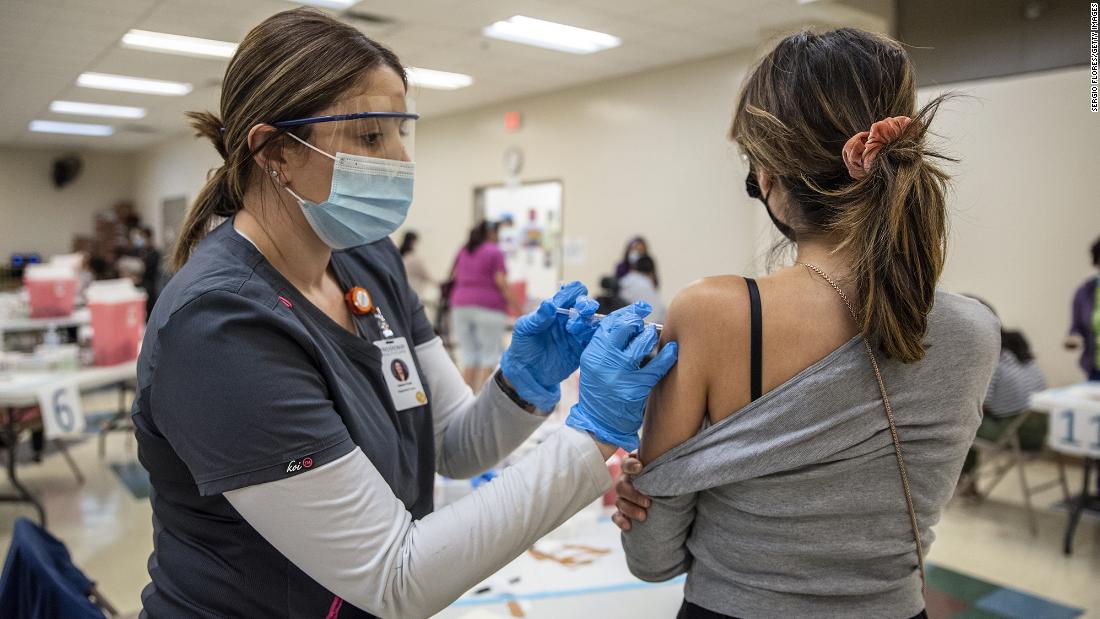
“As a blood clot expert, I can tell you it’s the most blood clotting disease we’ve ever seen in our lives,” said Dr. Alex Spyropoulos, a professor at the Feinstein Institutes for Medical Research in New York.
“I’ve been doing this for a quarter of a century. I’ve never seen these levels of blood clots.”
So they find it ironic that fear of a much, much rarer type of blood clot can now deter people from getting vaccinated.
Last week, the U.S. Centers for Disease Control and Prevention and the U.S. Food and Drug Administration recommended a break from providing Johnson & Johnson’s Janssen coronavirus vaccine while experts ITo determine whether it can cause blood clots and, if so, what to do about it.
The European Medicines Agency said on Tuesday it had found a possible link, but said the overall benefits of the vaccine outweigh the risks. For use in the EU, the agency said the vaccine should include a warning about “unusual low platelet blood clots” as “very rare side effects.”
The CDC’s Advisory Committee on Immunization Practices met last week to discuss the matter and decided to wait for more information after discussing the cases of six women who developed a very unusual type of blood clot after receiving J & J’s vaccine, as well as other possible cases. They will meet again on Friday to come up with recommendations, including an additional warning to help vaccine recipients and doctors look for the symptoms, or restrictions on who should receive the J&J vaccine.
Whatever the risk from vaccines, experts agree it is extremely low.
“You run the same risk of being struck by lightning as you are of having one of these rare blood clots,” Spyropoulos told CNN.
Multiple risk factors
Blood clots in general are very common – it affects 900,000 Americans each year, according to the CDC. They kill an estimated 100,000 people every year. Especially common are blood clots in the brain. According to the American Heart Association, about 795,000 people have a stroke every year in the US. The group estimates that 10-15% of these are related to adults under the age of 45.
Risk factors for common blood clots include surgery, accidents, cancer treatments and even sitting for too long, noted Dr. Mark Crowther, a hematologist and thrombosis expert for the American Society of Hematology.
“There are some weak risk factors – air travel, for example, if you’re flying from Hawaii to Los Angeles,” Crowther told CNN. “Long car journeys are risk factors,” added Crowther, who chairs the department of medicine at McMaster University in Canada.
And being infected with the coronavirus greatly increases this already common risk.
“Without a doubt, the vaccine drastically reduces the risk of any of the Covid-associated blood clots,” Crowther said.
“The odds of getting what we call vaccine-induced immune thrombotic thrombocytopenia, or VITT, is one in a million,” Spyropoulos said.
“The chances of being admitted to the hospital with Covid are about one in 100 for the adult population. The chances of having a blood clot once admitted to the hospital are probably one in five or one in six. . ” That risk rises to 1 in 3 for people in the ICU, Spyropoulos said.
“The benefits of each vaccine far outweigh the risks – period,” he said.
“This complication from the vaccine is excruciatingly rare. In the United States, more people will certainly be killed by small arms than by these complications,” said Crowther.
The rare blood clots associated with vaccines are one type that becomes apparent. They block the veins leading from the brain and cause a severe headache or severe stomach pain.
But they develop slowly, giving people the opportunity to get the right treatment – if they seek it in time.
Now media reports are starting to pop up about people having more common blood clots after vaccination. They are unlikely to be caused by the vaccine, but it’s difficult for people who aren’t trained in medicine to know the difference, Crowther said.
Getting vaccinated, especially against Covid, is a momentous event, and it is normal for people to develop a health problem shortly after being vaccinated so they can relate it to that vaccine.
“Hesitation to vaccinate is a real problem. There is no way for the average person to understand the magnitude of the risks,” Crowther said. The results can be more deadly than the blood clots.
Uncomplicated handling
The good news is that treating VITT isn’t complicated, the experts agreed.
“Any hospital in the United States would be well positioned to manage these blood clotting complications,” Crowther said.
What’s important for now is that doctors avoid using another common blood thinner known as heparin. Heparin itself can cause the same antibody response seen with VITT – and in fact, it was doctors familiar with the heparin-related response who noticed what might have been going on with the vaccines and blood clots.
The telltale signs of this rare reaction are not only blood clots, but also a low platelet count, which help the blood to clot.
That seems like a contradiction, but Spyropoulos says what’s going on is an immune response in which antibodies target platelets. “They form a complex that causes the platelets to clump together,” he said.
The platelets disappear from the circulation when they stick together. “You see some kind of gunk,” said Spyropoulos.


